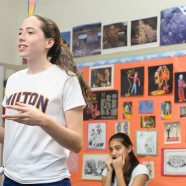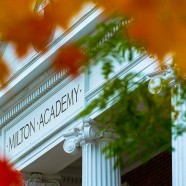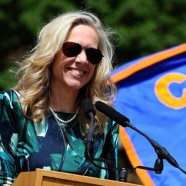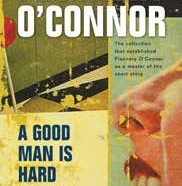In Sight, Fall 2014
Zion, March 2014 Images by Matt Magann ’17, render views of Zion National Park during Milton’s Outdoor Program trip in March 2014. Milton’s H. Adams Carter Outdoor Program was founded to honor the Milton graduate (’32), teacher and world-renowned mountaineer, who, in 1947, established the Program’s precursor, the Ski and Mountaineering Club. Through the Program, Milton students learn about the back-country for sport, beauty, contemplation and camaraderie. These outdoor experiences teach students to take responsibility, meet challenges, take intelligent risks, and to trust...
Read MoreGrade 8 Talks: What Should We Know About You?
It’s Monday morning, and 145 middle schoolers gather in Ware 500. The faithful assembly space buzzes with 8 a.m. energy. Left of stage, an eighth grader flips through a collection of notecards a final time. She takes two deep breaths and steps onto the stage, where four weeks of preparation will culminate in her Grade 8 Talk. On Mondays and Fridays for nine years now, eighth graders have shared themselves with their classmates, and prepared through this experience for the traditional Class IV Talks that lie ahead. Grade 8 Talks, the brainchild of Middle School director Will Crissman,...
Read MoreNew And Interdisciplinary: A Wider Lens, A Deeper Look
Eight new courses at Milton this year integrate disciplines in pursuit of a fuller understanding, and rely upon teachers working in collaboration. Last spring, teachers began preparing for their proposed course work through workshops with Veronica Boix Mansilla. A senior research associate at the Harvard Graduate School of Education, Veronica chairs the Future of Learning Institute. Her research examines how to produce quality interdisciplinary work addressing problems of contemporary global significance. Faculty are excited that these courses will allow students to think about relevant...
Read MoreCommencement Speaker Betsy Beers ’75
Five Things I Have Learned Since Graduating from Milton 1. You will always learn more doing a crap job than a great one. At some point, wait on tables, fold clothes at the Gap, or be a lowly assistant. Not what you expected to hear, right? Take waiting on tables: You see people at their best and their worst, and you have to learn to negotiate between a hungry public and a volatile guy in the kitchen who wields knives as part of his job. Ten tables, all seated at once, all hungry? I still have a nightmare that I come back to a station and all the customers are dead. So why is this important?...
Read More2014 Awards and Prizes
Priscilla Bailey Award To a senior girl who has been a most valuable asset to Milton Academy athletics and to the Milton Academy community — an athlete who has demonstrated exceptional individual skills and teamwork, as well as true sportsmanship. Kaitlin Kim Gately Henry Warder Carey Prize To members of Class I, who, in public speaking and oral interpretation, have shown consistent effort, thoroughness of preparation, and concern for others. Oluwayemisi Oluwakorede Olorunwunmi Daisy Eliza Walker Robert L. Daley Prize Created by his students of 1984 in his memory and honor, this prize...
Read MoreWalter McCloskey Names Eight to Remember Stories that moved him, and might move you
“Young Goodman Brown” by Nathaniel Hawthorne Hawthorne’s perverse sense of humor gives this allegory of universal guilt a distinctively comic undertone. “Bartleby the Scrivener” by Herman Melville Melville’s Bartleby, the lawyer’s scribe who practices a ferocious passive resistance, has taught me one of life’s most useful phrases: “I would prefer not to.” “The Old People” by William Faulkner In this story, which anticipates the much longer and more complex “The Bear,” Faulkner introduces one of his major themes: the multiple ways in which the past inhabits the...
Read More






